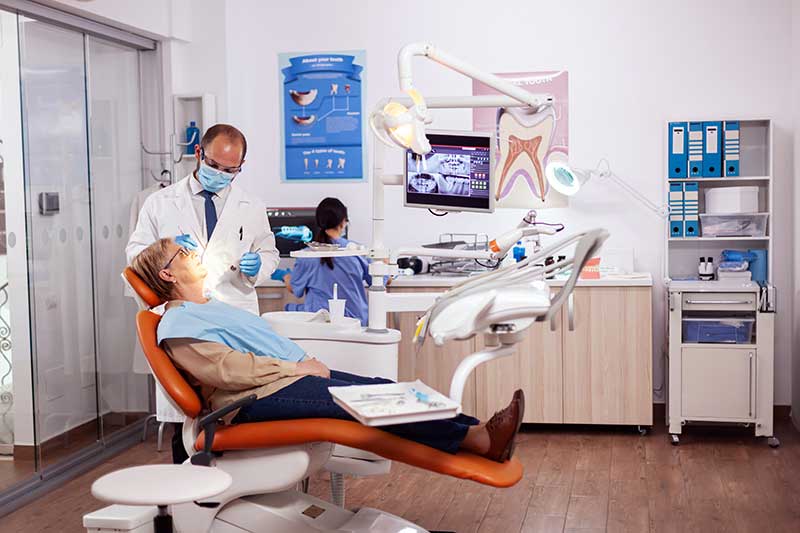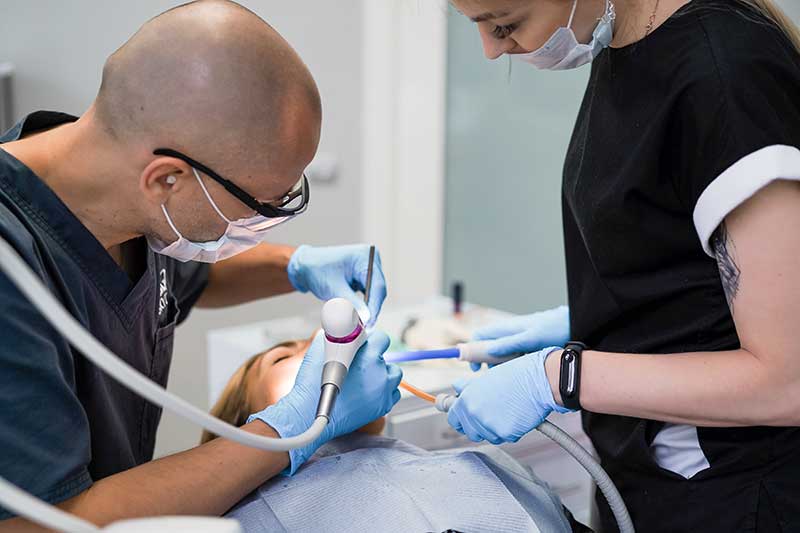Did you know that April is Oral Cancer Awareness month? It’s true! And it’s a great time for a public awareness reminder to go for an oral cancer screening and to know this is so important.
According to the Oral Cancer Foundation, roughly one person dies of oral cancer every hour of every day. That’s a lot of lives lost—and a lot of families and communities torn apart by oral cancer morbidity.
The good news? Advanced Indiana can lower the number of deaths from cancer by detecting oral cancer early. And the best way to discover early-stage cancer is with an oral examination and oral cancer screening.
What are oral cancer screenings?
Although tobacco smoking and drinking (alcohol misuse) are primary risk factors for oral cancer, everyone should get screened every year, because this type of cancer can affect anyone, regardless of smoking status or alcohol misuse.
The goal of oral cancer examination is to identify mouth cancer or other malignant disorders early when there is a greater chance for a cure. The primary screening test for oral cancer is a systematic clinical oral cavity examination.
Your dentist can detect signs of oral cancer during regular check-ups—including what your tongue looks like and how it moves, oral lesions of the tonsil, your palate, and the inside of your cheeks. If a visual examination or biopsy is needed, it won’t hurt much.

Why are Oral Cancer Screenings done?
Oral cancer screening examination is a quick, easy, and painless procedure that can make all the difference in the world when it comes to your dental health.
Oral Cancer Can be Easy to Miss
Oral cancer is the sixth most common cancer among men. If you have symptoms of oral cancer or potentially malignant disorders, they can be easy to miss. Many people who have oral cancer or potentially malignant disorders don’t notice any symptoms in the earlier stages, and even later on, many people attribute their symptoms to something else entirely.
This can mean that by the time cancer in patients is discovered it has already progressed past an easily treatable stage. Because oral cancer can be so hard to detect, regular oral exams are vital. A regular dental check-up and clinical examination that include an of the entire mouth and irregular tissue is important in finding early-stage cancer such as oral and oropharyngeal cancers (and pre-cancers).
Oral Cancer Screening Tests Let You Know About Earlier Treatment Options
According to a report by the Centers for Disease Control (CDC) and National Cancer Institute (NCI), there were 54,000 estimated new cases of oral and oropharyngeal cancer in the U.S. in 2022. Your dentist can also help you understand more about your oral cancer diagnosis, and earlier treatment options and give you behavioral counseling interventions, tobacco cessation interventions, and information about local support groups for patients and families affected by this disease in adults.
Oral Cancer Screenings Identify Those at Risk
Regular oral cancer screening examination for risk factors is important for anyone who has major risk factors of oral cancer or potentially malignant disorders. This includes people who have a natural history of tobacco use and consumption of alcohol, as well as people who have a family history of oral cancer. To help you determine if you are at risk for oral cancer or potential precursors, here are some additional risk factors:
- Age (People over 40 are more at risk)
- Tobacco product use or cigarette smoking
- Heavy alcohol consumption and alcohol misuse
- The human papillomavirus infection (HPV)
- Gender (Men are more susceptible than women)
- Unhealthy eating habits
- Prolonged sun exposure
Oral Cancer Screenings are Just One of Many Ways to Improve Your Overall Health
During our oral screening and test, our dental team educates you on improving oral health. They will begin a clinical exam of your mouth and connected tissues for any oral cavity damage, disorder from lesions, and abnormal cells caused by bad habits such as cigarette smoking or vaping, teeth grinding, brushing too hard, and your diet.
What are the risks of oral cancer screenings?
Although oral cancer screenings, oral exams, or adjunct tests are quick and painless, there are some limitations to using oral cancer screening exams, such as:
Oral Cancer Screening May Lead to Additional Tests
Many people have mouth sores, and the vast majority of these sores are not cancerous. An oral cancer examination cannot distinguish between cancerous and non-cancerous sores.
If we discover an unusual sore, you may be subjected to additional tests or a future assessment. The only way to know for sure if you have oral cavity cancer is to remove some abnormal tissue and cells and test them for signs of cancer risk or cancer cells/abnormal cells using a comprehensive examination procedure known as a biopsy.
Harms from Overdiagnosis
One potential harm to oral cancer-related checkups is the risk of performing unnecessary surgeries on patients who would have had no need for them if they had been screened during its earliest stages. Potential diagnostic harms are primarily related to the harms of biopsy for suspected oral cancer or its potential precursors.
Harms of treatment for screen-detected oral cancer and its potentially malignant precursors (leukoplakia and erythroplakia) may result from complications of surgery (first-line treatment), radiation, and chemotherapy. Finding something suspicious isn’t necessarily a cancer diagnosis.
There is No Direct Evidence that Oral Cancer Examination Reduces Oral Cancer Mortality Rates
There is no direct evidence that routine oral examinations for signs of oral cancer in patients can reduce the number of deaths from the disease. Although, screening for oral cancer may aid in the detection of cancers at an earlier stage when cure is more likely.

How do you prepare?
Oral cancer screenings are actually easy and hassle-free. There is no need to prepare or fast for oral cancer screenings. It is usually done during routine dental exams, so you can do it while you’re at the dentist anyway!
How often should you have oral cancer screenings?
According to a study, 1 out of 4 oral, head, and neck cancers particularly in patients over the age of 50 are detected in patients who do not smoke or drink alcohol; which means regardless of your natural history, you need to be screened at least once a year by your physician or dentist.
As a result, many dentists recommend having regular oral cancer screenings and potential precursors that include an oral screening examination of the entire mouth. Adults and pregnant women over the age of 20 should be screened every three years, while those over the age of 40 should be screened annually.
If you want a beautiful smile and overall good health, you need to take care of your mouth. That’s why it’s so important to get regular oral cancer screenings—and it’s easy to do if you get them from a professional Indiana dentist here at Advanced Dental Care!
Technology photo created by Kireyonok_Yuliya – www.freepik.com
Dental treatment photo created by DCStudio – www.freepik.com

